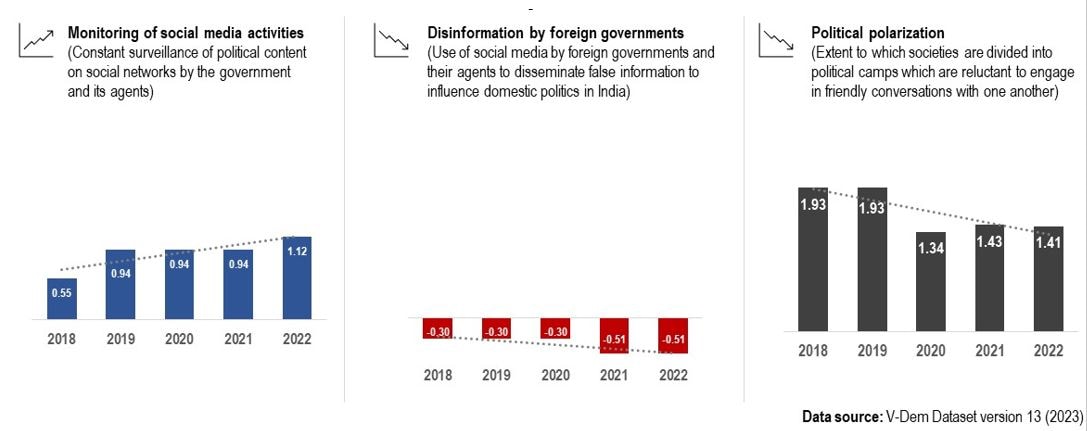Why social media watchdogs are necessary to battle disinformation and polarisation of society
A research by IIM Kozhikode offers a balanced perspective on social media monitoring, recognising it as a potentially crucial measure to combat the threat of disinformation and polarisation
 Americans are increasingly split into two distinct political factions, each driven by contrasting worldviews vying for supremacy in today’s America.
Image: Shutterstock
Americans are increasingly split into two distinct political factions, each driven by contrasting worldviews vying for supremacy in today’s America.
Image: Shutterstock
In 2024, the world is set to witness a record-breaking election surge, with over two billion voters across fifty countries heading to the polls. In the wake of the world’s largest elections concluding in India, the United States, an economic powerhouse, is preparing for its presidential elections amidst growing polarisation. Americans are increasingly split into two distinct political factions, each driven by contrasting worldviews vying for supremacy in today’s America. This polarisation of societies reflects a widening gap between people’s beliefs and perspectives, pushing them to extremes and reducing the middle ground for constructive dialogue.
In response to these threats, we are witnessing a concerted effort to address the twin issues of polarisation and disinformation, recognising their potential to sway public opinion. Policymakers and other authorities are actively implementing strategies to counter disinformation, leveraging fact-checking tools, and promoting media literacy. For instance, the recently introduced European Union’s AI Act emphasises transparency as a key principle. It mandates that creators of deepfakes must clearly disclose that their content is artificial and explain the process behind its creation. This rule aims to help people identify AI-generated content, thereby reducing the risk of manipulation through disinformation. In response to the threat posed by deepfakes, over 20 US states have enacted regulations against their use in elections. However, the Federal Election Commission has yet to implement any restrictions, and related bills in Congress remain stalled. Simultaneously, initiatives to bridge ideological divides are underway, emphasising the importance of fostering a more united and informed electorate. As we navigate the complexities of modern communication, the focus on combating both disinformation and polarisation underscores a commitment to preserving the democratic fabric of nations. This places the 2024 election season at a crucial juncture where the dynamics of online communications will play a pivotal role in influencing countries’ political trajectories.
Decoding the dynamics of political disinformation and polarisation
Recognising the rising significance of online communication in political discussions, a research team from IIM Kozhikode, comprising the authors of this article, conducted a global study. We explored the impact of political disinformation and the monitoring of online discussions, which involves tactics such as social media surveillance. The focus was on societies susceptible to polarisation. Utilising data from the annual reports of the Digital Society project, a division of the V-Dem Institute at the University of Gothenburg’s Department of Political Science in Sweden, we conducted a comprehensive analysis across 177 nations. The aim was to grasp how these countries monitor communication in the digital realm and address issues related to political disinformation. The findings highlighted the evident influence of disinformation in fueling polarisation within societies. Notably, the findings offered a balanced perspective on social media monitoring, recognising it as a potentially crucial measure to combat the threat of disinformation and polarisation. How to read these charts? The values represent estimates derived from the V-Dem measurement model. The estimates for “Monitoring of social media activities” and “Disinformation by foreign governments” have been inverted to enhance interpretability. For instance, greater values on the chart for “Monitoring of social media activities” reflect higher levels of social media surveillance in the country.
How to read these charts? The values represent estimates derived from the V-Dem measurement model. The estimates for “Monitoring of social media activities” and “Disinformation by foreign governments” have been inverted to enhance interpretability. For instance, greater values on the chart for “Monitoring of social media activities” reflect higher levels of social media surveillance in the country. Figure: The charts focus on India, showcasing a five-year trend across the phenomena. A rise in the surveillance of social media activities coincides with a drop in disinformation from foreign governments and political polarization in the nation.
Also read: How to prepare for AI-generated misinformation
Do the online communication trends in Indian politics offer a lesson for the world?
Intrigued by the findings, the authors delved deeper into how the narrative surrounding online discourse has evolved within Indian politics, hoping to convey a global message by unravelling the complex dynamics and influences contributing to the country’s continually shifting digital communication landscape. While polarisation remains evident in the nation’s politics, there has been a simultaneous spike in the adoption of online monitoring measures. In the context of India, the research team analysed trends in factors influencing polarisation over the past five years. During this timeframe, there was a consistent rise in efforts related to the surveillance of social networks. In line with the global observations, the increased efforts to monitor social media likely played a role in curbing false information spread by foreign governments through online platforms. The surveillance efforts also demonstrated significant success in reducing political polarisation within the country, as evidenced by the downward trend depicted in the chart. This offers a potential roadmap for other nations grappling with the dual challenges of countering foreign disinformation and mitigating the escalating threat of polarisation.The relevance of these findings in the election season
Understanding the complex dynamics of our modern world and exploring the factors that drive disinformation and polarisation in countries is not only an intellectual pursuit but also a priority for safeguarding societal unity and upholding the foundations of democracy. In our constant fascination with the limitless possibilities of online communication, we confront several challenges in a political environment that heavily depends on it. Uncovering essential insights into disinformation and polarisation is crucial for a healthy democracy as we approach the 2024 elections in the United States and many other countries. As nations prepare for political changes, the findings from this study become vital in strengthening the democratic process and ensuring an informed electorate amid the rise of digital (dis)information.Prof. Debashis Chatterjee, Director, IIM Kozhikode
Dr. Pramukh Nanjundaswamy Vasist, Alumnus, IIM Kozhikode
Prof. Satish Krishnan, Professor, IIM Kozhikode

















